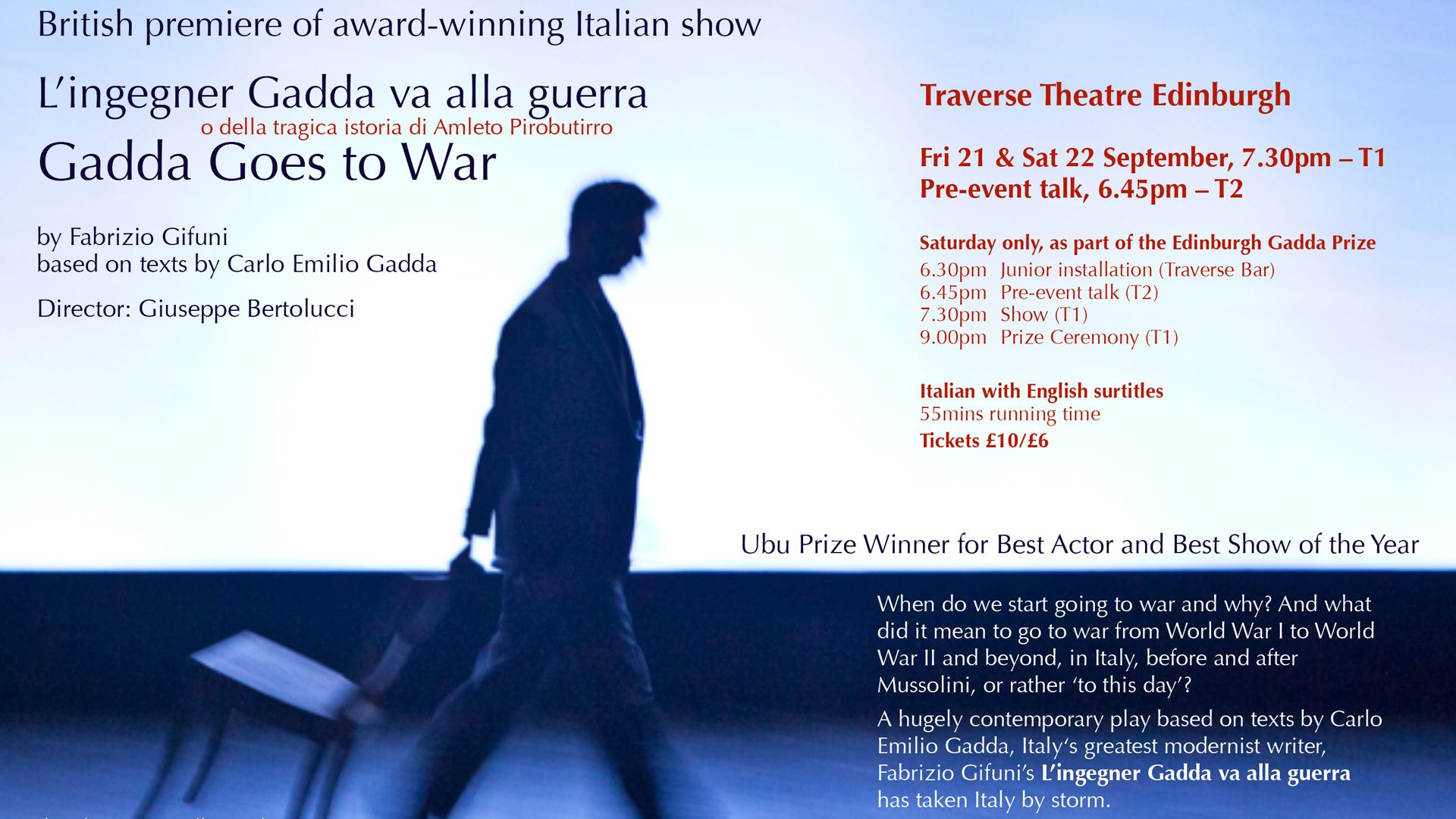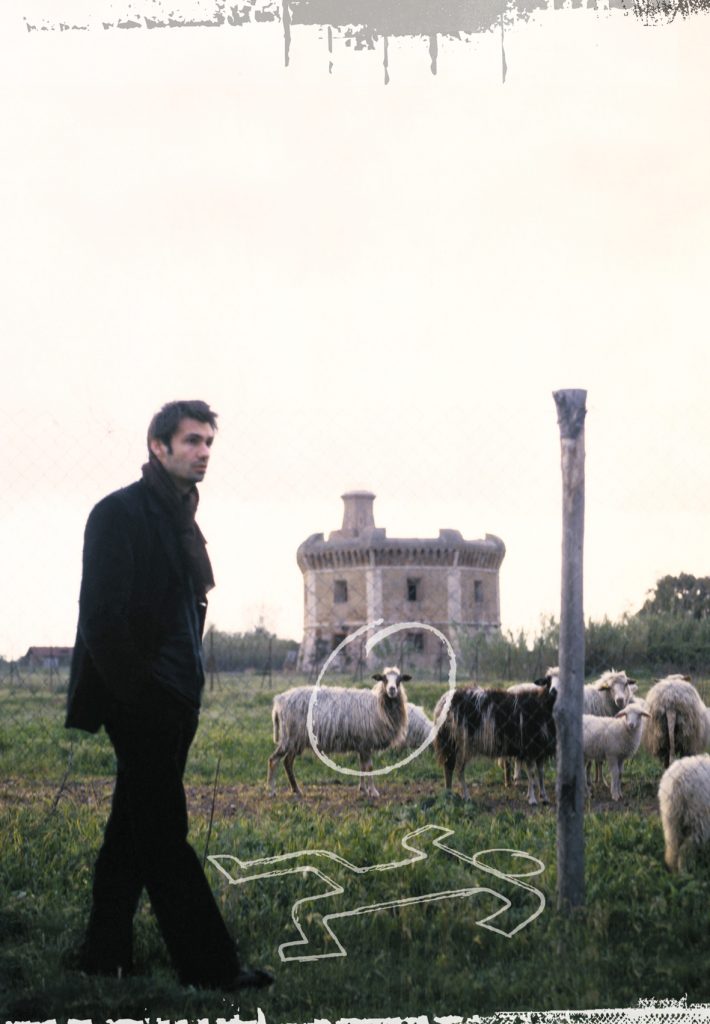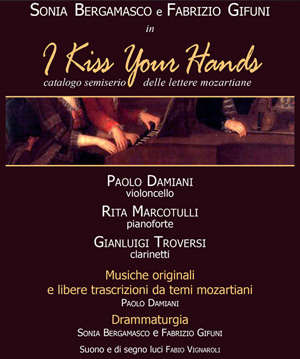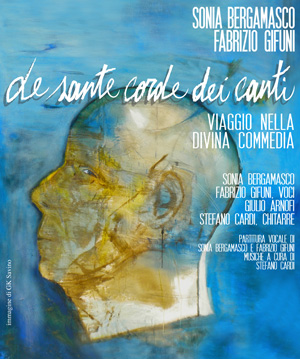
L'officina dell'ingegnere - L’ingegner Gadda va…a Edimburgo

I commenti del pubblico
Andrew Miller
The last night’s performance of Gadda Goes to Warat the Traverse wassuperb.
The autobiographical part showing the madness of war was poignant and moving. The actor was pure genius and the monologue most impressive.
Thank you so much for the invitation to such a splendid, yet disturbing evening.
Twenty years after WWI wehad WWII! What did we learn?
Professor Andrew Miller Secretary and Treasurer The Carnegie Trust for the Universit iesof Scotland
Sergio Della Sala
Too of ten we hear “people are not interested” when the discussion revolves around thought provoking performances or cultural events. Unfortunately this is the legacy of twenty years of humiliation of the great Italian culture, a period during which circenses took the place of lofty shows and emotion loaded scripts.
It was therefore a delight to attend to this Gadda revival, which was profound, intense, and attention-grabbing, ye thighly entertaining, engaging and occasionally amusing. It is almost incredible how actual this pieceis, and the performance is so poignantas to stiradmiration as well as deep emotions.
This show should be capital is edupon as one of the best ambassadors for Italian refinement, demonstrating that nani e ballerine is not all we can export.
Please do distribute it. It is an act of patriotism.
Professor Sergio Della Sala Human Cognitive Neuroscience University of Edinburgh
Maryla Green
You should be basking in the glory of a truly amazing event. Your vision was achieved in a most spectacular way at the Traverse!
Maryla Green, Edinburgh
Sergio Casci
Spectacular performance by Fabrizio Gifuni in his one-man show Gadda Goes to Warat the Traverse in Edinburgh last night.
Congratulations to Federica Pedriali and everyone else involved.
Sergio Casci Screen writer, Glasgow
Giorgio Granozio
Fabrizio Gifuni is a great actor, simply brilliant and exceptionally gifted. His interpretation of Gadda last night at the Traverse showed me that Italy is still alive and its theatrical tradition thriving. Gifuni’s performance evoked memories of legendary actors from the Compagnia dei Giovani, Vittorio Gassman, Carmelo Bene, as well as politically committe dones like Gian Maria Volonté, just to mention a few of my favourites.
Through Gadda’swords, Gifuni/Amleto Pirobutirro launches a histrionic tirade against the Italian political systemd uring the First World War and the Fascist regime that followed; he analyses three generations of Italian history, not to mention the narcissistic imbecility of the Duce himself in which the modern audience finds a none-too-subtlenod to the behaviour of Italy’s former Prime Minister.
I would like to thank Professor Pedriali for bringing the UK premiere of such an important show to Edinburghas part of her Gadda initiatives.
An unforgettable evening.
Giorgio Granozio Architect and Visual Artist, Edinburgh
Linda Fabiani
We thoroughly enjoyed the play on Friday evening. Very powerful and moving. We ha ve been discussing it a lot since!
Linda Fabiani MSP, Minister for Europe, Edinburgh
Tony Miller
I wanted to know more about Gadda and now I do. What a splendid way to introduce this author to the British public.
Tony Miller Architect, Glasgow
Silvana Vitale
A powerful, thought-provoking play and a truly amazing initiative. Gifuni’s stunning performance offered the lay audience notonly a great introduction to Gadda’s writings but also a deep insight into an important era.
Most importantly, though, this initiative is a fine example of how academia can successfully reach and engage the wider local community as well as build bridges between communities and cultures.
BRAVO to everyone involved in this project.
Silvana Vitale Translator, Edinburgh












